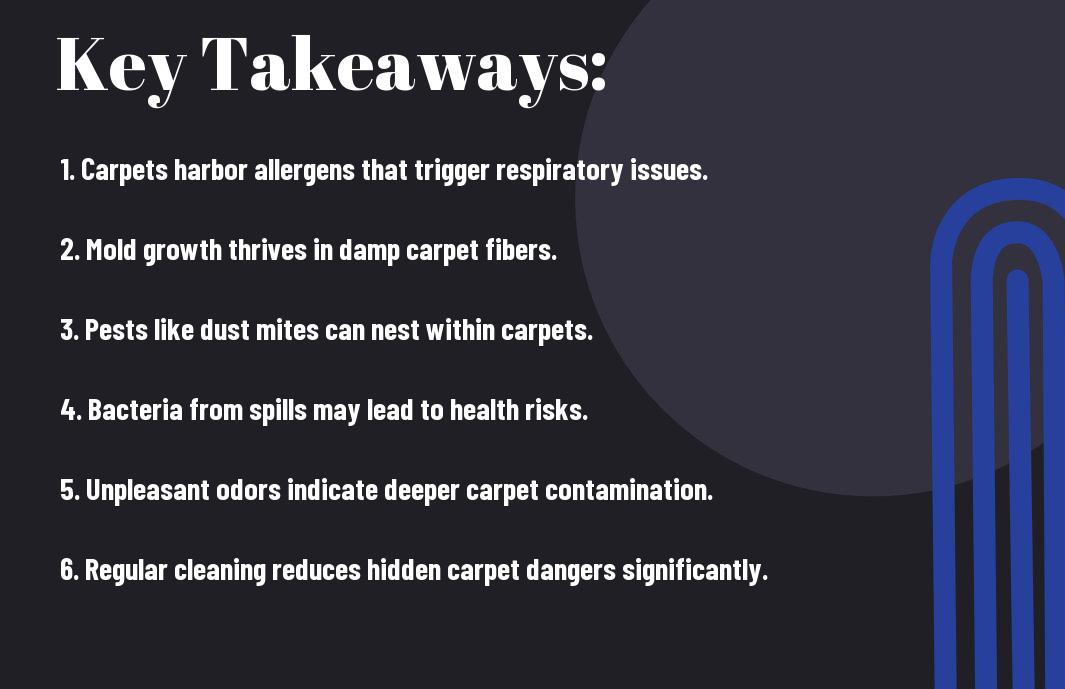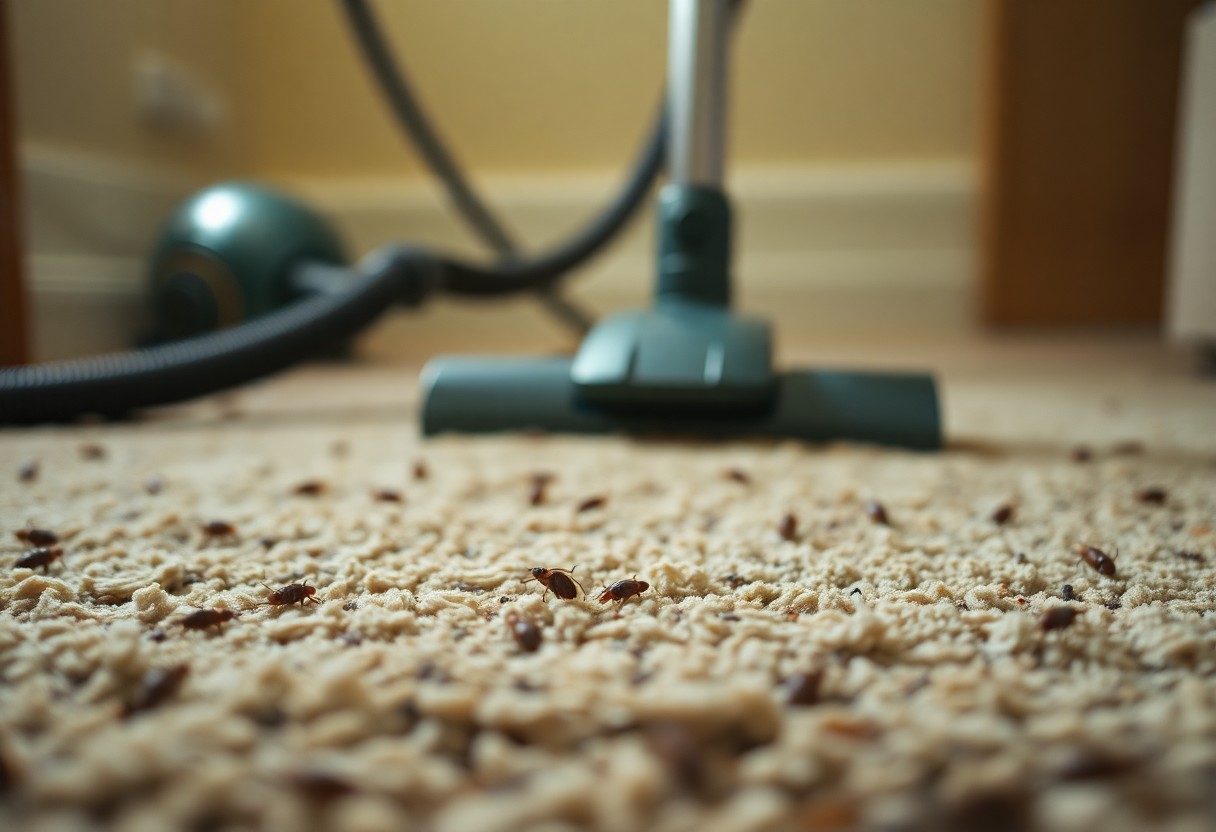Just when you think your home is a safe haven, your dirty carpets may be hiding a world of unseen dangers. You may be surprised to learn that unkempt carpets can harbor allergens, bacteria, and even pests that pose significant health risks to you and your family. In this post, we’ll explore the hidden hazards lurking in your carpets and why regular cleaning is important for maintaining a healthy living environment. Dive in to discover what you might be stepping on every day.

Contents
Common Contaminants in Carpets
Your carpets can often hide a plethora of contaminants that pose health risks. While they may appear clean on the surface, microscopic allergens, bacteria, and viruses can accumulate within the fibers, leading to various health issues. Understanding what lurks beneath can help you take appropriate measures to ensure a healthier home environment.
Allergens and Irritants
Between pet dander, dust mites, and pollen, your carpets can become a breeding ground for allergens and irritants. These tiny particles can trigger respiratory issues, allergies, and asthma attacks, particularly in sensitive individuals. Regular cleaning and maintenance can help in reducing your exposure to these harmful substances.
Bacteria and Viruses
Among the most concerning contaminants in your carpets are bacteria and viruses. These pathogens thrive in dark, damp areas, making your carpets an ideal environment for their growth. The presence of these microorganisms can lead to various infections and illnesses, impacting the health of you and your loved ones.
Indeed, research has shown that carpets can harbor bacteria such as E. coli and Staphylococcus aureus, which can lead to serious health complications. High foot traffic increases the potential for pathogens to be tracked in, while spills and moisture can create a perfect breeding ground. Regular professional cleaning and immediate treatment of spills can greatly reduce the risk of these harmful bacteria and viruses lurking in your carpets.

The Health Risks Associated with Dirty Carpets
Some aspects of dirty carpets may pose significant health risks that can affect you and your family. Accumulated dirt, allergens, and harmful bacteria can lead to a range of health issues. Regular cleaning is crucial to maintain a safe and healthy living environment, as ignoring your carpets can ultimately have serious consequences for your overall well-being.
Respiratory Issues
Associated with poor indoor air quality, dirty carpets can lead to respiratory problems such as asthma and allergies. Dust mites, pet dander, and other irritants find a cozy home in your carpets, becoming airborne whenever you walk on them. Breathing in these allergens can exacerbate existing respiratory conditions or even trigger new sensitivities.
Skin Conditions
Against this backdrop, dirty carpets can also contribute to a variety of skin conditions. Allergens and bacteria residing in your carpets may lead to itchy, irritated skin or even rashes. The continuous exposure to these irritants can aggravate existing skin issues, making it imperative for you to take action.
To combat the potential skin issues linked to dirty carpets, regular vacuuming and deep cleaning are foundational practices. These methods not only remove surface debris but also target hidden allergens and bacteria ingrained in the fibers. Consider investing in professional cleaning services or using specialized equipment to ensure a thorough approach, allowing your carpets to remain fresh and safeguarding your skin health.
How Dirt and Bacteria Accumulate
Many homeowners are unaware of how quickly dirt and bacteria can accumulate in carpets. Each day, your carpets serve as a pit stop for various contaminants such as dust, pet dander, and spilled food. Left unchecked, these hidden dangers can flourish within the fibers of your carpets. To protect yourself and your family, it’s necessary to understand the hidden dangers lurking in your carpets and take proactive measures to keep them clean.
Daily Foot Traffic
Beside the obvious wear and tear, daily foot traffic brings in a plethora of dirt, germs, and allergens. Each time you walk across your carpet, you may be delivering traces of what you tracked in from outside, including pollutants and particles that become lodged in the fibers.
Improper Maintenance
At a glance, your carpets may seem clean, but lack of proper maintenance leads to the buildup of grime and harmful bacteria. Regular vacuuming is necessary, yet neglecting to deeply clean carpets can create a hidden habitat for allergens and odors.
And consistent improper maintenance leaves your carpet vulnerable to more than just visible stains; it allows bacteria and odor-causing microorganisms to thrive. Over time, this neglect transforms your once-inviting carpets into a breeding ground for harmful agents that can negatively impact your health and indoor air quality. Regular deep cleaning is necessary to combat this issue and ensure a healthier living environment.
Best Practices for Carpet Cleaning
After understanding the hidden dangers of dirty carpets, implementing best practices for carpet cleaning becomes necessary for maintaining a healthy home environment. Regular maintenance can significantly reduce allergens, improve air quality, and prolong the life of your flooring. By following a comprehensive cleaning routine, you keep your carpets looking great while providing a safe space for your family.
Regular Vacuuming
Along with schedule regular vacuuming, as it plays a vital role in carpet care. Aim to vacuum at least once a week, or more frequently in high-traffic areas. This practice helps remove dirt, dust, and allergens that accumulate over time, improving the cleanliness and appearance of your carpets.
Professional Cleaning Services
For optimal carpet care, consider scheduling professional cleaning services kedai cuci karpet near me periodically. A trained technician uses specialized equipment and cleaning solutions that reach deep into the fibers, effectively eliminating dirt, stains, and odors that regular vacuuming can miss.
But these professional services do more than just enhance the aesthetics of your carpets; they also improve indoor air quality and extend the lifespan of your carpeting. Depending on your household’s needs, aiming for professional cleaning every 12 to 18 months can make a significant difference. Investing in this service not only protects your carpets but also protects your family’s health from hidden hazards lurking within those fibers.
DIY Solutions for Carpet Care
Now that you understand the hidden dangers of dirty carpets, it’s time to take matters into your own hands. DIY solutions for carpet care can not only save you money but also ensure a clean and healthy home environment. From natural cleaning products to effective stain removal techniques, you can tackle those stubborn messes and keep your carpets looking pristine without resorting to costly commercial cleaners.
Natural Cleaning Products
The best part about maintaining your carpets is that you can harness the power of natural cleaning products available in your home. Simple ingredients like baking soda, white vinegar, and crucial oils can create effective and eco-friendly cleaners. For example, a mixture of vinegar and water can break down grime and eliminate odors while remaining safe for your family and pets.
Effective Stain Removal Techniques
An effective stain removal technique is crucial for preserving your carpets’ appearance. The key is to act quickly and gently blotted the stain with a clean cloth or paper towel. Avoid rubbing, as this may spread the stain or damage the carpet fibers. Depending on the stain type, you can use a combination of natural cleaners or store-bought options to lift the mark.
Cleaning stains effectively often involves more than just a quick wipe. For example, if you face a stubborn red wine spill, first, blot the area gently, then apply a solution of club soda and salt to neutralize the color. Allow it to sit for a few minutes before blotting again. Each stain may require a different treatment method, but patience combined with the right approach ensures your carpets stay vibrant and damage-free.
Preventive Measures to Keep Carpets Clean
Not only do clean carpets improve the aesthetic of your home, but they also promote a healthier environment. Implementing a regular cleaning schedule and encouraging proper maintenance will help reduce allergens and prolong the life of your carpets. Vacuum regularly, attend to spills promptly, and consider using professional cleaning services periodically to maintain the condition of your carpets.
Area Rugs and Mats
To protect your carpets, you should strategically place area rugs and mats in high-traffic zones, such as entrances and hallways. These coverings act as barriers collected dirt and moisture from shoes, preventing them from settling into your carpets. Regularly clean and replace these mats to ensure they effectively serve their purpose.
Indoor Shoe Policies
For a cleaner home and healthier carpets, consider implementing an indoor shoe policy. By encouraging family members and guests to remove their shoes at the door, you can significantly reduce the amount of dirt, allergens, and pollutants that enter your living space. This simple habit can help maintain the cleanliness of your carpets and create a more inviting atmosphere in your home.
Another effective method to enhance your indoor shoe policy is to provide alternatives, such as indoor slippers or designated house shoes. This not only keeps your carpets clean but also makes your guests feel welcome and comfortable. Additionally, you can place a stylish shoe rack near the entrance to encourage participation, making it easier for everyone to comply with your indoor shoe policy.
Conclusion
Ultimately, you must recognize that dirty carpets can harbor a range of hidden dangers, from allergens to harmful bacteria. These elements not only impact the cleanliness of your home but also your health and well-being. Regular cleaning and professional maintenance of your carpets are imperative to ensure a safe and hygienic living environment. By taking preventative measures now, you can safeguard your home and family from the unseen threats that may be lurking beneath the surface.
